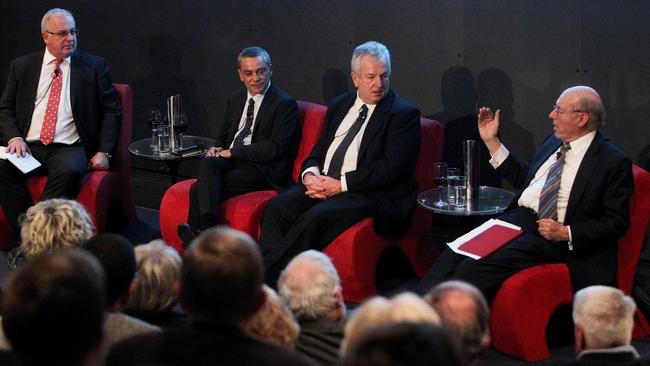If Alan Kohler was PM and Robert Gottliebsen was Treasurer
Here are five measures the government could adopt if it really wanted to rein in the deficit.

A subscriber in the audience appointed Alan Kohler as Prime Minister and myself as Treasurer and asked us what we would do.
Alan said the biggest problem was the deficit so handed the speaking to me and, off the cuff, I used the ideas that had been discussed at that and the previous meetings with subscribers.
Here is my five point plan:
- Do a ‘Paul Keating’ and go through the budget line by line. Peter Costello also did this but since then no one has bothered — they leave it to the public servants.
- Any expenditure where the states are already performing the task is immediately crossed out. That would cover infrastructure, health, education and many other areas. I would ask Andrew Robb to help me and I could save at least $20 billion. Some services will be reduced but most of the cuts avoid duplication and, if anything, services will improve.
- I want to substantially reduce the cash economy. In theory I should make conventional employment easier by changing the “fair work” rules. But as I can’t change the Fair Work Act, I will make sure the tax commissioner’s staff actually obey the Howard legislation on contracting. I would then make home cleaning, gardening, home repairs etc contracting tax deductible up to 20 per cent. Everyone in those cash dominated areas would then start paying tax and/ or claim less social services. Net revenue would go through the roof. The cash economy is huge.
- I would freeze all defined benefit superannuation benefits to public servants employed prior to 2007 to a market value of $1.6 million. If the market value of their pension is already above $1.6m they can keep the surplus.
- If over two years these measures did not cover the shortfall, I would raise taxes and to get over the Senate problem I would sit down with the crossbenchers and discover what they really wanted to achieve.
I would enlist Alan’s help to deliver at least some of their wishes in exchange for approving the measures that go close to balancing the budget. Balancing the budget is vital and if I achieve that ask I will put my hand up for Alan’s job.
Meanwhile it was a fascinating three nights.
The Brisbane, Melbourne and Sydney subscribers to The Australian are close to being united on one issue — they feel apprehensive about the long-term implications of a series of events taking place in Australia and around the world.
Those events are led by the inability of the Australian government to meaningfully tackle the deficit (we borrow to pay salaries and fund state duplication) and the danger that presents to our credit rating and therefore our interest rates.
But around the world other causes of nervousness here in Australia include, the negative interest rates that we are seeing in so many markets, the huge debt build up in some countries (especially China), the currency games that are being played globally and the possibility that Donald Trump might become US president.
Our subscribers are not in any way panicking but if they are running a business they are apprehensive about being over extended and if they are saving they have to tackle the need for risk taking to get yields given the current low deposit rates.
And as a result when we asked the audiences for questions, inevitably the preponderance of questions were related to these events.
When you talk to bank chief executives, they bemoan the fact that even though businesses have the capacity to borrow, and banks want to lend, demand is weak.
However, there is another dimension to the weakness in small- and medium-sized business demand for loans. In previous decades banks and their affiliated finance companies understood how to judge a business and how much money to lend.
That skill has been lost and, instead, the banks want the security of the family home.
Couples running small- to medium-sized business have watched their friends lose their house, often because the banks have panicked unnecessarily, when there was a downturn. The spouses of some entrepreneurs (and those entrepreneurs can be male or female) do not want to risk the family home.
If banks want to lend to the sector, they need to regain their old skills.
I don’t think that is possible, so, more and more, the space will be taken by non-bank lenders who might cost more but who understand the risks involved.
While much of the audience focused on risks and matters economic, when we started talking about housing, I watched the audience in each state edge forward — not wanting to miss a word.
If there is one area where Australians are still prepared to take risk it is dwelling investment.
We had long discussions about the apartment markets (Brace for hit as towers tumble, September 16). A few merchant bankers in one of the conferences said that they’re trying to overcome Chinese buyers’ failure to settle and a big rise in student numbers is good news.







At last night’s meeting with subscribers to The Australian I received an invitation I could not resist.